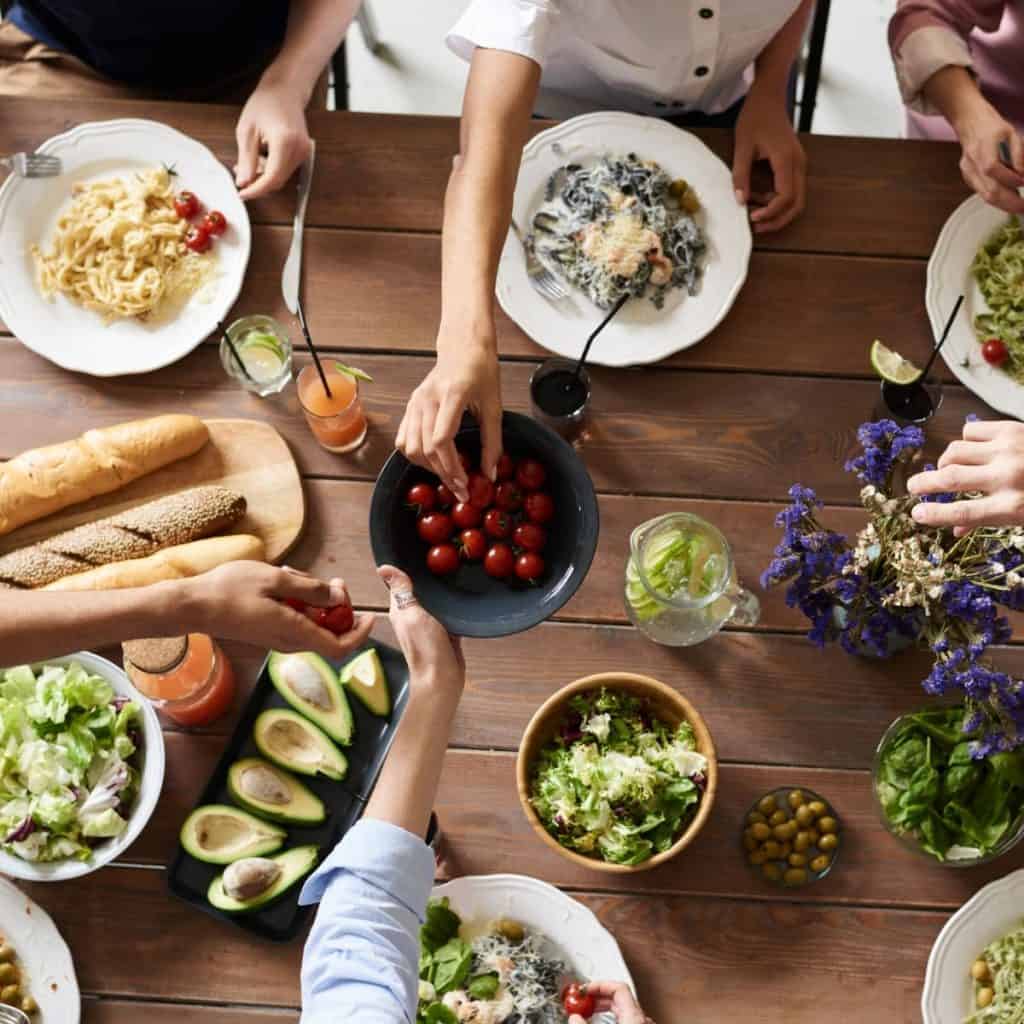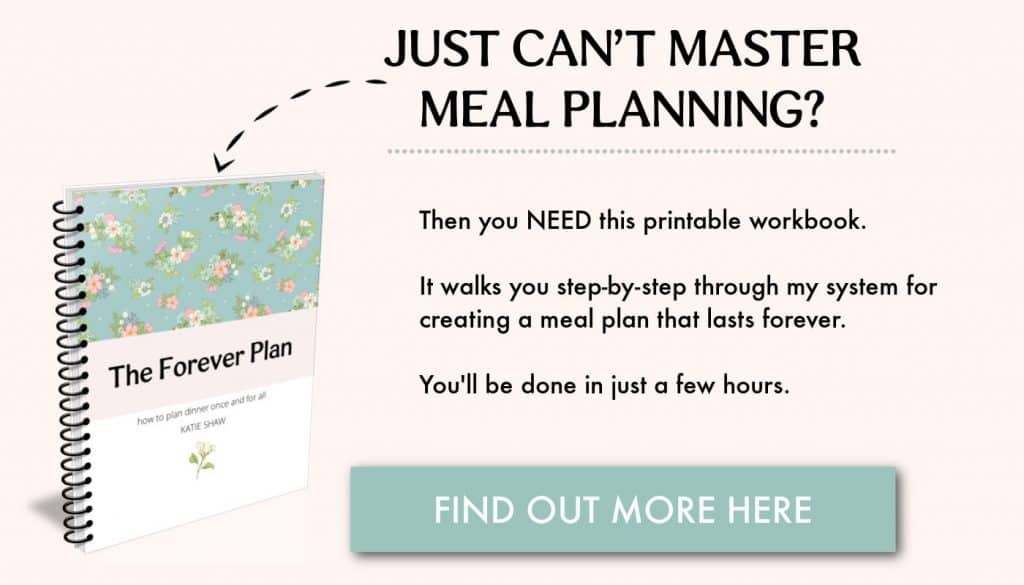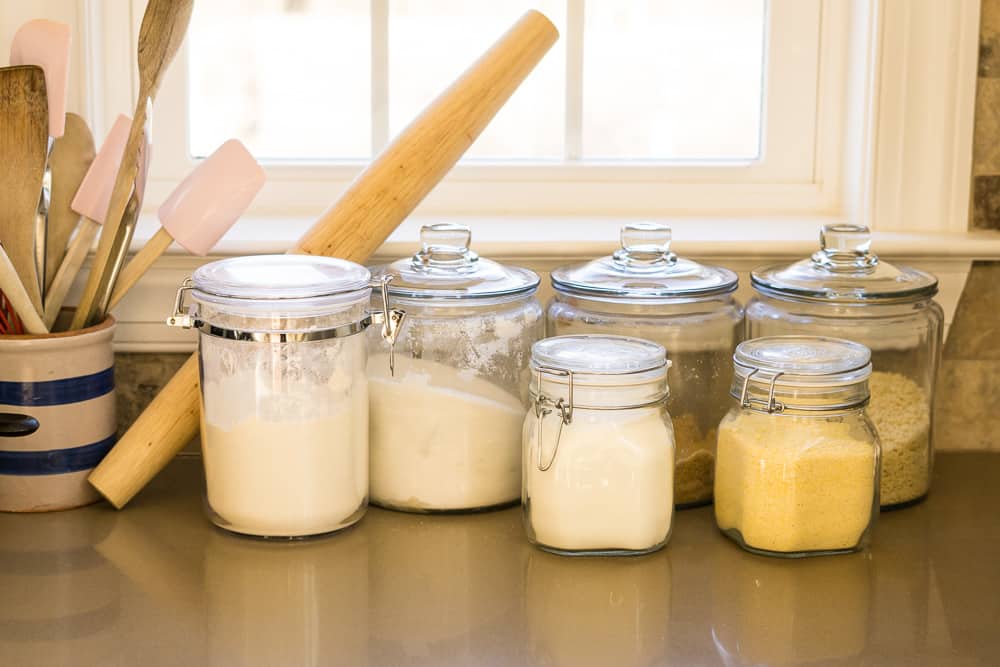How to Cook Dinner Every Night (Without Going Insane)
If you understand the value of cooking and eating at home but need practical tips to make it work, here are some strategies to make dinner at home every day a priority.

Have you ever given up going out to eat? It’s one of those things that is easy to say, and much harder to do.
When we were saving to build this house, we committed to stop going out to eat for a year, which was hard. No take out, no fast food, nothing. Even though we didn’t feel like we went out to eat all that much, it was shocking to discover how much we were spending on food outside the home. We would spend normally order pizza once a week and go to an inexpensive sit down restaurant once a week, and it all added up to about $500 per month in restaurants. And that’s just for two meals a week! It was shocking.
heirloom homemaker email course
A 5-day series straight to your inbox to help you create a beautiful home life.
No logins, no guilt, no overwhelm.
Promise.
I promise to keep your email address safe. Unsubscribe at any time
So we knew that cutting that out of our budget was important to be able to save what we wanted. Now I love cooking and baking, but there is something about having to do it every single day that be a bit soul crushing. The planning, cooking, serving, cleaning, and shopping can get old fast. But during that year of strict eating at home I learned a few systems to keep my spirits up and our food budget down.
To be honest, I am glad that we can now treat ourselves again with a meal out. But the year of cooking sort of reset my expectations and allowed me to see restaurants as a treat and home cooking as the norm. Here are some ways to make it as enjoyable as possible.
Let’s chat
1. Plan your meals
This can be super simple or very complicated. But if you want to start eating at home on a regular basis, meal planning is key. Don’t get overwhelmed with complicated calendars or a monthly plan. Just plan out what you’re eating for dinner for one week on a piece of paper.
But the most important part is knowing what you are going to make for dinner that specific night. Think about it once it in the morning and know what you’re making. Do you need to defrost anything? Marinate? Do you have everything you need? Are you sure?
Then in the early afternoon, start whatever you can. Chop and put things on plates and pop them back in the fridge. Make the salad and the bread. Take out the canned stuff and put it next to the stove. The less you have to do at dinnertime, the better.
This also stops people from sharing their opinions about what you have planned for dinner. It’s already started, people. We’re eating it.
2. Stop making every meal a multi-course affair
So if the first step stressed you out a little (make the bread?! start the salad?!), keep this one in mind. Not every dinner has to be fancy. In fact, most dinners should not be complicated.
If you are making bread, multiple side dishes, and a dessert most nights, that is exhausting and can’t happen seven days a week. You are setting yourself up for failure. Find some simple, one-pot recipes that are still good. They don’t have to be the most amazing thing you’ve ever tasted. There is absolutely nothing wrong with serving hot dogs, fresh fruit, and baked potatoes. Don’t kill yourself trying to impress people. Your family would prefer a happy wife and mother over elaborate meals on a daily basis.
Other easy dinners that are more than acceptable: scrambled eggs, sandwiches, salads, or baked drumsticks.

3. Prioritize what should be homemade and what shouldn’t
It’s easy to get carried away with the idea of cooking “from scratch”. Does that mean that we have to make every salad dressing, every French fry, and and every tortilla that enters our house? No.
Some things are worth making from scratch, and some aren’t. (There’s actually a great book specifically about this if you’re interested.) This is a very personal decision depending on your tastes and your budget. If buying some things ready-made helps you with your ultimate goal of eating at home every night, then it is best to go ahead and buy them. If you are constantly frustrated by cooking because everything seems hard because you have to make tortillas instead of serving quesadillas as a simple meal, then please stop. Just buy the tortillas.

4. Plan to fail, and have backups available
Even if you have planned your meals, have the staples you need, and have some simple meals you can whip out, there will be days when you just can’t cook. This happens to all of us. When there are kids involved or a job outside the home, life can get extra crazy. So if you really don’t want to resort to takeout or drive throughs, you need some ready-made convenience foods.
These are only useful when you have them in the house already for when you need them. So get a few frozen meals, make peace with it, and leave them there for when you need them.
5. Embrace Leftovers
Once you get in the habit of cooking at home you will have a lot of food. This means… leftovers. If you hate leftovers, I understand. But leftovers represent a night that no cooking has to be done, so it’s time to make friends with them.
If you have leftovers after every meal, designate one night a week as leftover night. If that night rolls around and there aren’t quite enough leftovers to make a meal out of them, add a salad, sandwich, or frozen meal to round it out. Just get those leftovers eaten! They represent money and hard work and it is too depressing to throw them out.
Hope this helps!
So if you have found yourself in a place of wanting or needing to cook dinner every night, I hope these strategies help it feel more achievable.
Love,











Excellent and reassuring article, I’ve always hated and resisted meal planning thinking of it as meals I won’t like rather than I’ve actively chosen A you’ve helped me flip that, ty so much for these points x
thank you so much Lucy ❤️ glad it was helpful.
Very helpful, thank you!
you are very welcome Emily 🙂
While I enjoyed your article, I’m not sure why one would need to enjoy cooking every night in order to do it. I come from a family that cooked the majority of the time, and eating out was very rare, so maybe that’s why I don’t understand the focus on enjoying it. I was taught by both my grandmother and mother that cooking was just what was done and sometimes, just like every other chore, you did it whether you wanted to or not.
hi dragonfly, i get what you are saying. but i think a lot of people do not have the ability to just push through… it’s so easy to order out with a few swipes that it comes a habit. easier to to attack the problem of disliking something and build a positive habit. hope that makes sense 🙂
if you know you have a busy day grab the crockpot! Three or four chicken breasts or a pork shoulder or pork tenderloin into the crockpot along with a bottle or jar of your favorite bbq sauce. set it on low for 6 hours or high for 4. pull apart with 2 forks when done. Serve with sandwich rolls.
Loved the ease of your ideas. I was beginning to think I couldn’t ever be frugal if it wasn’t made from scratch (ie: bread, pie dough, etc). thanks for reassuring me. I think I am being really frugal in my old age (75).
hi virginia- so glad the ideas helped you. the world loves to trick us with an all-or-nothing approach, doesnt it?
I’m in my late 60s, I come from a family with four kids and we never ever went to restaurants when I grew up. Mom cooked every day. She didn’t need a complicated mealplan, we ate cooked potatoes with gravey and different veggies almost everyday, no salads, just cooked veggies. On wednesday we had a meatball added to it, and the gravey had to last untill Friday. Once a week we had mac and cheece a rice dish or leftovers. On Saturdays we had pancakes or frenchfries and on Sundays, cooked potatoes veggies and beef and the gravey of the beef had to last untill Tuesday. We only had a nice dessert on Sunday, the rest of the week dessert was an apple or an orange or plain yoghurt. It sounds boring but we didn’t know any better, that’s how everybody ate.
We didn’t have a thousand options with breakfast and lunch either. Breakfast was whole wheat bread with cheece or oatmeal and lunch was just the same bread with bolony or jam.
I think moms make it way to complicated nowadays. We also didn’t have a dishwasser. Every night after dinner mom did the dishes by hand for all 6 of us and the kids had to help clean the table, dry the dishes and put them away again.
That was our normal life, we didn’t know any better and we were not damaged by it in any way.
Sounds perfect to me. Healthy & simple.
Planned leftovers are a thing—that helps! If you’re cooking chicken tenders, for example, then add a few extra to the pan. Those extra, cooked tenders make for quick chicken salad the next day or for added protein in a main course salad. When you’re chopping vegetables for a recipe, chop the whole carrot or celery bunch (or at least make veggie sticks & portions). Those become a quick, ready to eat crunchy snack or side dish for lunch. You get the idea—the examples are endless.
I am not a fan of eating out. If I eat out, it has to be because I’m meeting friends, the restaurant is fancy, or it is for a type of food I don’t cook at home. I’d rather cook for my friends than go out. I base my meal planning by what is in season and what is on sale. I can roast a whole chicken and have chicken and a baked potato. The next night, I can have chicken and rice with peas and carrots. The next night, I can have baked chicken spaghetti with a parmesan topping. Right now, eggplant, squash, onions, and haricourt verts are in season. I’ve made eggplant parmesan, squash patties, and stir fried green beans with bell peppers. It’s all quite easy. Set it out on the dining table with flowers and pretty dishes and good music playing. You will not miss eating out.
We call leftovers Mustgos! Usually it’s a Wednesday or Thursday night because I cook most meals on the weekend. Meal prep on
Saturday cook mostly Sunday.
L I ve the way you handle
the dinner night.Makes sense .And very helpful.
Very to the point.
Katie,
Your comments are beautiful, awesome. It’s exactly what I have figured out after many miserable evenings. I don’t find that there is an easy solution. Everything you say is right on point. But it is still hard work! Planning my menue ahead of time usually works. Starting early in the day makes a huge difference. But there you have it. Miserable Anyway
p.s. You didn’t mention anything about cleaning up the mess after dinner which I find a huge PIA. My husband has always done the dishes – which is a spectacular blessing.
I freeze my leftovers so they don’t go bad. Once a week, I get them all out and thaw, then we have “fridge boogie buffet.” Everyone fills their plate and nukes it.
Hi Katie,
I want to let you know how much I am enjoying your entire blog. I’ve read a lot of homemaking blogs over the years, but I have to say, yours is my favorite so far. You offer practical, doable advice that totally resonates with me. I can’t thank you enough for the blessings you have been to me so far and I look forward to many more!
To answer your question in email, meals and cooking are my least favorite thing to do as well. I wish I could hire a chef! Lol I just dislike the process so much, especially the planning! But your article above, along with others I have read recently in your archives/emails are inspiring and will help me immensely when I apply it ! Which I plan to do! ❤️ Thanks again, Pam
Pam, Thank you so much for this comment! It made my day! (And I am the same with dinner. Working on it, as always!)
I like to call leftovers, Restaurant Night, and I write on the menu chalkboard all of the different options. It’s fun for the kids and sounds more interesting!
oooh love that idea!
These are fantastic tips, Katie! Wow! $500 a month! That is a tremendous savings, especially when you look at that over an entire year!